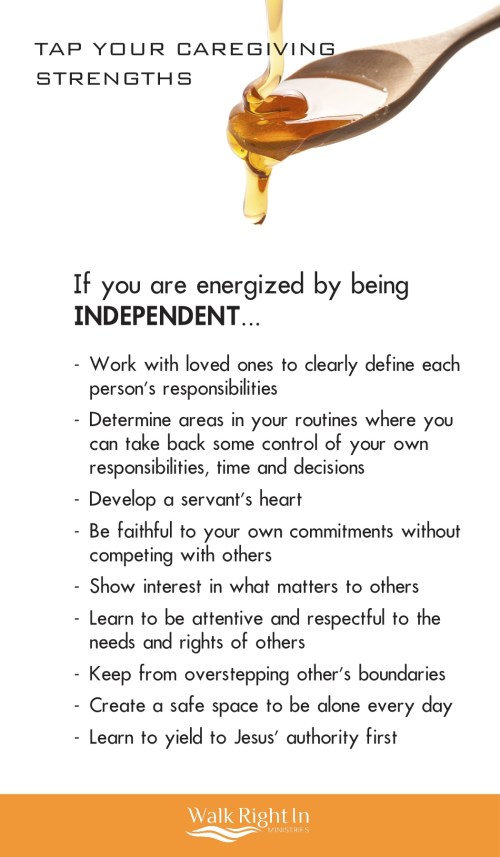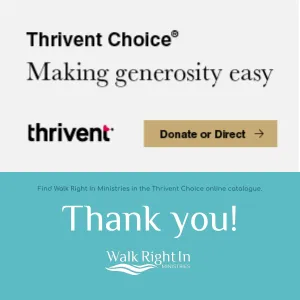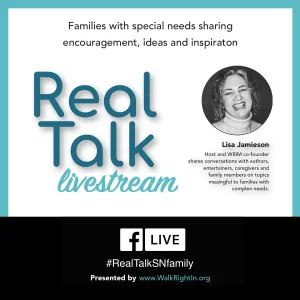
Today we’re exploring some challenges and opportunities for caregivers who tend to be independent and are needed in some kind of caregiving role with a loved one. This is the fifth article in a series exploring what puts family caregivers in their “sweet spots” when supporting someone with special needs.
Independent people have wonderful potential to be very effective caregivers. Your strong decision-making abilities and great capacity to take on responsibilities will work to your advantage. You may, at times, feel like the schedules and needs of others are cramping your style. But, if you learn to make healthy adjustment in your attitude and behavior, anger won’t control you and your relationships will be enhanced.
Independent people don’t necessarily desire to have much control or influence over others. Some do. But many do not. Most of all, they don’t want someone else exerting too much influence over their life and circumstances.
If this describes you and you’re needed in a caregiving role, you may feel, at times a bit suffocated by the time and attention others need from you. You’re likely to struggle without adequate pacing of quiet time to spend time thinking thankful thoughts, doing your own thing and making your own decisions. Even if you genuinely desire to be of help, you may find yourself feeling robbed of freedoms, spontaneity and independent decision-making.
Don’t underestimate the value of well-placed breaks. Long periods without some amount of time to yourself is likely to put a strain on you. Your situation may not afford long or frequent breaks yet pauses from being responsible for others will go a long way toward keeping you refreshed. Work with family members and others who can contribute to sharing the cares so that you can develop an adequate rhythm of respite. Just knowing when your next break is coming is of help. A getaway on the calendar, simply a routine walk alone around the neighborhood or even time spent working in another job you enjoy will help you persevere.
Being a very independent person also means that you are self-motivated. Among your many strengths is the ability to gather and analyze the situation, come to conclusions and then respond according to what is needed. If you do happen to find yourself struggling with motivation, it will help to make sure you have sufficient and accurate information so you can draw your own conclusions and be confident in how you’ll respond. Ambiguity or lack of clear expectations can result in frustration and hesitation for someone who is independent. This can look like procrastination or stubbornness to others but will often have a great deal to do with your self-confidence.

All of us have strengths and weaknesses. It can be very helpful to recognize your vulnerabilities and learn how re-aligning with the Holy Spirit will move you back toward your strengths.
Your strong will can be both a strength and a weakness. For example, you will probably have a great desire to follow rules and procedures. You’re attentive to details and can be relied on to implement a quality care plan without a lot of supervision. In fact, you’re probably a good leader and very helpful in training new caregivers about the details and nuances in the realm of caregiving. However, you may have high expectations that others will learn quickly and implement those details perfectly. You may have no particular interest in controlling other people but you do want them to follow the rules and procedures put in place just as would be expected of everyone else on the team. You may not be aware that others feel a great deal of pressure to live up to your expectations because your expectations of yourself are even higher.
If you are experiencing a great deal of stress and anxiety, it will probably help you to learn that the lines of “right” and “wrong” may not be as black and white as they seem. Things that are unimportant to you or very important to you may be on a very different priority list for someone else. You will find your life and relationships to be richer when you work alongside others in collaboration rather than by exerting your own ideas and conclusions.
When working in areas that are familiar to you, you’ll be very efficient at those responsibilities. In fact, you may become so focused on working efficiently that you may sometimes forget to consider the thoughts and feelings of others. Being aware of this strong drive will help you to lean into the Holy Spirit for help in balancing efficiency with sensitivity.
If you are an independent caregiver, you will also find it helpful to be allowed to work at your own pace and in one steady shift that allows you to be efficient. Feeling pressured about external deadlines or the personal timelines of other people may trigger anxiety or frustration for you. Recognizing this can be very helpful since knowing what is triggering your reactions provides clues about how to pray for God’s strength as well as how to communicate clearly with others about what will help you stay in your strengths.
Be aware that people may perceive you as controlling even though you actually have little or no interest in holding power over others. It may be that your inflexibility, fear of failure and procrastination are impacting others in a way that makes them feel they’ve lost control. Even a few minutes alone every day can bring out your kinder and more flexible side. Cooperate with your team to give each other breaks for naps, hobbies, watching a movie, playing on a computer, going to work outside of the home or even doing nothing. These independent times will be powerful in rejuvenating you and making you much sweeter to be around.
It may surprise you to know that very independent people are often quite family oriented. You may have difficulty expressing your tender feelings around those you are closest to. In fact, your indirect behavior and sarcasm may be confusing to others. This can be especially true in families where there is a non-verbal person with disabilities. Your family may have become quite intuitive in their interactions with one another. However, body language, anger, tone of voice and seemingly critical words can often be misunderstood. It would be very helpful for your family to regularly “clear the air” with family meetings and conversations that foster clarity, repentance and forgiveness.
Things that tend to trigger stress and anger for you probably involve change, taking on responsibilities in areas where you feel unfamiliar or ill-equipped, feeling others don’t respect the things that are important to you, and frustration when others insist on the importance of things that don’t seem very important to you.
If you feel your competence is being questioned you may feel defensive, hurt or angry. It can be very helpful to ask God to show you what is real and what is perceived. More often than not, your concerns about what others think about your efforts are more imagined than real. While others may not tell you often or well enough, you are probably more valued than you realize. Your uncertainty about what others think about the quality of your work may be coming primarily from your own high expectations of yourself.
You’re likely challenged in the area of anger management. You may not even know that anger is problem for you. But members of your family and those who work closely with you probably do know. You may deny your angry feelings (or simply not recognize them as anger) unless or until you are intensely angry.
Caregivers who learn to deal constructively with their anger will find themselves much better able to cope with the tough issues of life and much more satisfied in their relationships. Anger does need to be expressed. But it needs to be expressed in healthy, godly ways.
The Holy Spirit promises to help us when we’re feeling weak. We are also promised to have our consciences wiped clean as we seek Jesus’ presence and trust Him (Hebrews 10:22).
As an independent person who is called to a role in supporting a loved one with special needs, you will find your sweet spot in that role by learning to deal with your anger constructively, give yourself and others the right to be imperfect, avoid holding grudges, continually forgive past mistakes, ensure for yourself some quiet time alone every day, develop routines that allow for you to be productive, keep focused on the positive side of life and make a point of expressing your tender feelings.
TAP YOUR CAREGIVING STRENGTHS BY DEVELOPING A COMPASSIONATE HEART
If you’re energized by being independent…
- Seek a role on the caregiving team that prioritizes responsibilities in areas where you can control your own circumstances, time and decisions
- Work together with loved ones to clearly define each person’s responsibilities in running an effective household
- Develop a servant’s heart in your responsibilities
- Be faithful to your own commitments without competing with others
- Learn to show interest in what matters to others
- Learn to be attentive and respectful to the needs and rights of others
- Communicate daily with loved ones to keep from overstepping their boundaries
- Create a safe space in your home where you can spend some time alone every day
- Determine areas in your routines where you can take back some control
- Learn to yield to Jesus’ authority first

The Bible offers an abundance of help and hope for people who are independent. If any of these verses seems especially encouraging to you, you might consider committing it to memory.
Philippians 4:19
And this same God who takes care of me will supply all your needs from his glorious riches, which have been given to us in Christ Jesus.
Romans 12:1b-2
This is truly the way to worship him. Don’t copy the behavior and customs of this world, but let God transform you into a new person by changing the way you think. Then you will learn to know God’s will for you, which is good and pleasing and perfect.
Ephesians 4:26
“Don’t sin by letting anger control you.” Don’t let the sun go down while you are still angry.
Acts 3:19
Now repent of your sins and turn to God, so that your sins may be wiped away. 20 Then times of refreshment will come from the presence of the Lord, and he will again send you Jesus, your appointed Messiah.
Romans 2:4
Don’t you see how wonderfully kind, tolerant, and patient God is with you? Does this mean nothing to you? Can’t you see that his kindness is intended to turn you from your sin?
Romans 12:10
Love each other with genuine affection, and take delight in honoring each other.
Lord Jesus, thank you for loving me just as I am. You are so wonderfully kind to me! You know full well how hard I work and how much I enjoy my rest. You have equipped me to be highly capable and to serve my loved ones loyally. You understand the pressures I feel too. I need your grace, strength and hope to carry me from one day to the next. Jesus, forgive me allowing ingratitude, impatience, pride and anger to control me. Praise God, I am not a slave to sin! I am free to trust your easy yoke and light burden. Teach me, more and more, how to love tenderly, serve faithfully and trust you fully. Help me to experience my deepest rest and satisfaction with You. Amen
Tell us in the comments what works for you and your family!

Lisa Jamieson is a caregiver consultant, pastoral counsellor and author of popular books and Bible studies including Finding Glory in the Thorns and Jesus, Let’s Talk. Lisa and her husband, Larry, live in Minnesota with the youngest of their three grown daughters, Carly, who has Angelman Syndrome. Together, the Jamiesons founded Walk Right In Ministries in 2008, a non-profit organization building faith and community with special needs families. Lisa is the primary contributor on the www.WalkRightIn.org blog sharing practical and spiritual encouragement for parents and other family members caring for children with health and developmental challenges. She also serves on the Key Ministry writing team where she contributes monthly articles for special needs parents and church leaders. Her personal blog www.lisajamieson.org also provides encouragement for people who find themselves in challenging places.










0 Comments
Trackbacks/Pingbacks